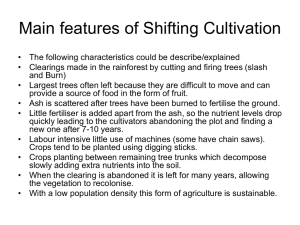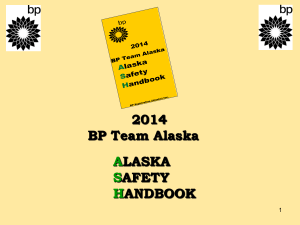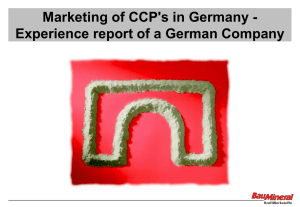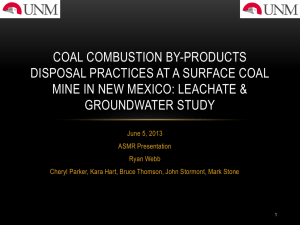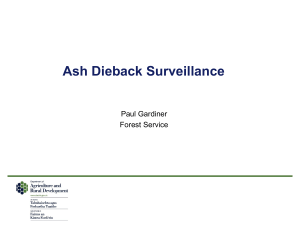Coal Ash Beneficiation and Recycle Options
advertisement
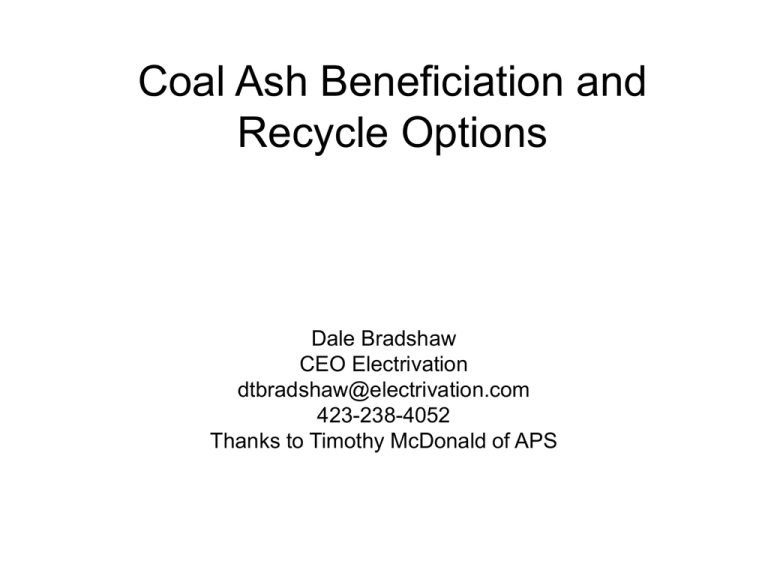
Coal Ash Beneficiation and Recycle Options Dale Bradshaw CEO Electrivation dtbradshaw@electrivation.com 423-238-4052 Thanks to Timothy McDonald of APS National Coal Combustion ByProducts (CCB) examples Power Plant Coal pile FGD Sludge Pulverizer Fly Ash ~80% Bottom Ash - Gypsum wallboard - Blended cement - Portland cement - Cenospheres - Concrete products - Structural fills - Road base - Mining applications - Soil modification - Waste stabilization ~20% - Road base - Structural fill - Snow & ice control - Concrete products - Portland cement - Aggregate CCB Utilization • • • • • 71.7 million tons fly ash produced nationally (2007 data) 18.1 Mtons bottom ash and 12.3 Mtons FGD gypsum 47% of ash and gypsum used in construction Dependent on local markets, hauling costs, economy Revised EPA rules for coal combustion byproducts (CCB) expected by February-March 2010 • CCB stigma if regulated as hazardous waste • Expect impacts on handling, utilization, disposal options • Beyond just utilization – must consider ash material Reduction, Conversion and Reclamation options Methods to Reduce Coal Ash Coal Processing ( RED = New Equipment ) Coal to Boiler Density Classifier Coal Pile Pulverizer Magmill Reject inorganics & coal Supercritical Water Carbon recovery Reactor Pyrite, Feldspar Quartz, and Other Inorganics Exothermic heat to Boiler Coal Processing Details • Magmill – dry magnetic cleaning of pulverized coal w/ maximized removal of pyrite and other minerals • Techinomics Inc. - density classifier to remove ash • Magmill and/or classifier will need carbon recovery • Carbon Recovery Alternatives: – Supercritical water conversion of carbon w/ heat recovery – Separation Technologies (ST) Inc. extraction process • Electrostatic concentration and recovery of carbon from ash • Concentrated carbon recycled as boiler fuel input – PMI Ash Technologies LLC carbon burn-out technology • Eliminate carbon in remaining inorganic ash material • Cleaned ash / ore suitable for “Mining” • Exothermic heat recovery to plant • Carbon recovery may be required with either coal cleaning technology as appropriate. Both cleaning technologies may be required to maximize this ash Reduction option. Magmill • Dry magnetic cleaning of pulverized coal • APS power plant coal tested at Magmill pilot site • Reduce Ash, SO2, Hg • Improve power plant performance & reliability • Carbon recovery to plant • “Mining” ash concentrate • Plant demo(s) ?? Magmill System Techinomics Density Classifier • Rotating throat-ledge cover system • Demonstration at Gavin power plant – AEP • Pyretic rock is efficiently removed from pulverizer • Increased primary air velocity but not flow mass • Improved coal fineness and boiler combustion Coal Ash Conversion Option Using Russian Hydroalkaline process with ST magnetic separator Fly Ash Coal Ash “Mining” Silo Figure 4. Flow Sheet for alumina, silica and iron recovery from ash Ash beneficiation variant operations ST magnetic separator [FLY] ASH Carbon to Boiler Activation Magnetic Separation Fe2O3 - Concentrate Hydroalkaline Silica Extraction Alumina Concentrate Alloys Refractories Building materials Regeneration Alumina Production “Mud” Alumina Silicate Alkaline Solution Portland Cement Process into Pure Silicate Products: Silicates, Silica, Zeolites, White Soot, Glass Components, Ceramics, Cement, [Aerogel] and Other Coal Ash “Mining” Coal Fly Ash Processing into Metallurgical and Silicate Chemical Products: • Russian HYDROALKALINE pilot process w/ magnetic recovery of concentrated Fe2O3 • Ferric-oxide recovery approx 50% • Hydroalkaline silica extraction approx 60%-77% • Bauxite quality Alumina ash remaining for processing • Alumina production residue “mud” is considered a valuable Portland cement additive Ash Beneficiation Alternatives: (see Coal Processing) • Separation Technologies (ST) process separates carbon from fly ash w/ carbon recycled back to boiler • PMI Ash Technologies carbon burn-out technology w/ heat recovery back to boiler RockTron Eco-Minerals • • • • • RockTron is a UK company; http://rktron.com Fiddler’s Ferry eco-mineral processing plant is on-line Designed to process 800,000 tons of fly ash per year Processes both fresh and stockpiled ash (ash pond?) RockTron eco-mineral coal-ash products: – – – – Alpha and delta cement additive pozzolanic glass spheres 90% purity carbon Cenospheres Spherical magnetite RockTron Eco=Mineral Reclamation Process • RockTron eco-mineral recycling of ash ponds(?) • Replacement w/ lined ash ponds and enhanced dams • Dewatering bags within lined basins • Convert de-watered pond ash into Geopolymer Concrete for enhanced structures and/or products FLYASH “MINING” Collaboration Opportunities • • • • • • • • Nalco Mobotec: Magmill concentrate EERC, Univ. of North Dakota: Coal Ash Research Center BHP Billiton: Four Corners plant coal supplier University of Wisconsin, Madison: Center for By Products Utilization Lyntek Inc., Denver Co Pittsburgh Mineral & Mining Technology Inc. University of Arizona, Chemical Engineering and Material Sciences Departments Others…… Keystone Metals Recovery, Inc Process for recovering Metals from Coal Ash • The coal ash is heated in a CFBC using coal and the carbon in the ash (LOI) to break the physical bonds of the metals in the ash with the waste heat used for a small T/G or used to by-pass feedwater heaters in the plant. • The ash is chlorinated with the metal chloride gases (Al, Ti, Fe, and others) removed from the remaining solids (Silicon oxide) in cyclone separators. Coal ash has the following: – – – – – 50% to 55% sand 22% to 35% Al 3% to 10% Fe 1% to 1.5% Ti Trace quantities of germanium, gallium, Hg, etc. • The metal chlorides are reduced to molten metals and formed into ingots for sale. (electricity used to produce the Al from the chloride is 65% less than production from bauxite). Ball • The remaining sand can be stacked on site or sold. Keystone Metals Recovery, Inc Process for recovering Metals from Coal Ash • Keystone has successfully tested the chlorination and recovery steps in the lab • Keystone is attempting to secure $30 million for a 50 tpd pilot plant and has a $5 million commitment from Ball canning and will generate excess electricity for the grid and have a profit of $2 million per year. • Keystone would then scale up to a 1,000 tpd plant which would cost about $200 million to $250 million and would generate a pre-tax operating profit of $72 million from the Al and the Ti sales only. Keystone Metals Recovery to chlorinate ash and recover valuable AL, Ti, Fe, and other heavy metals.
